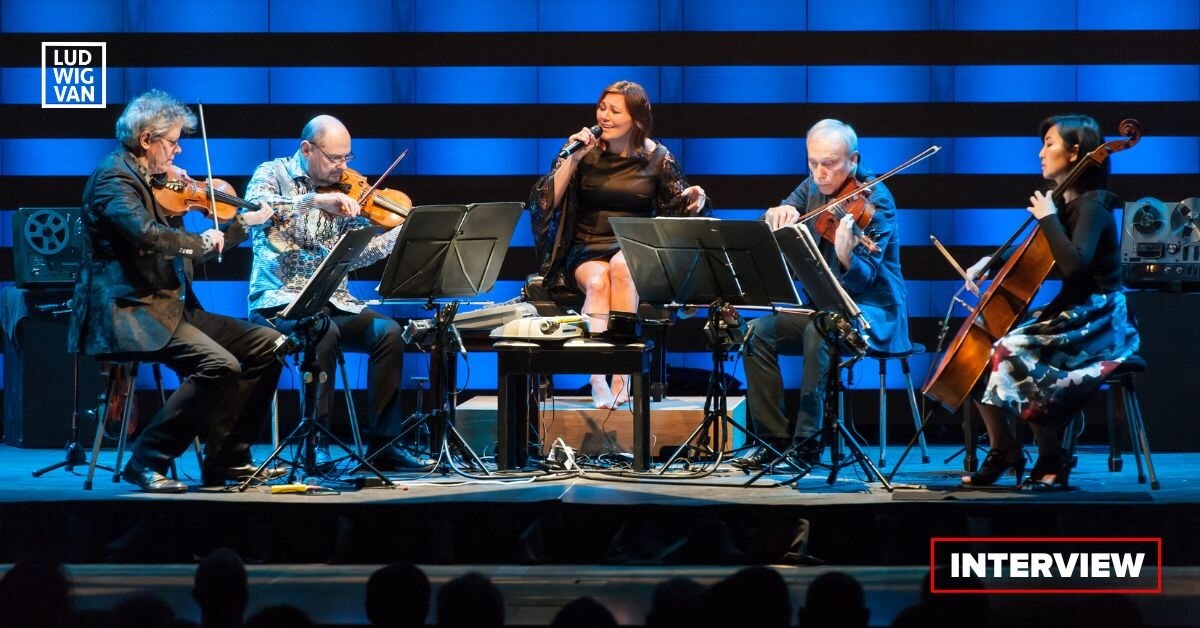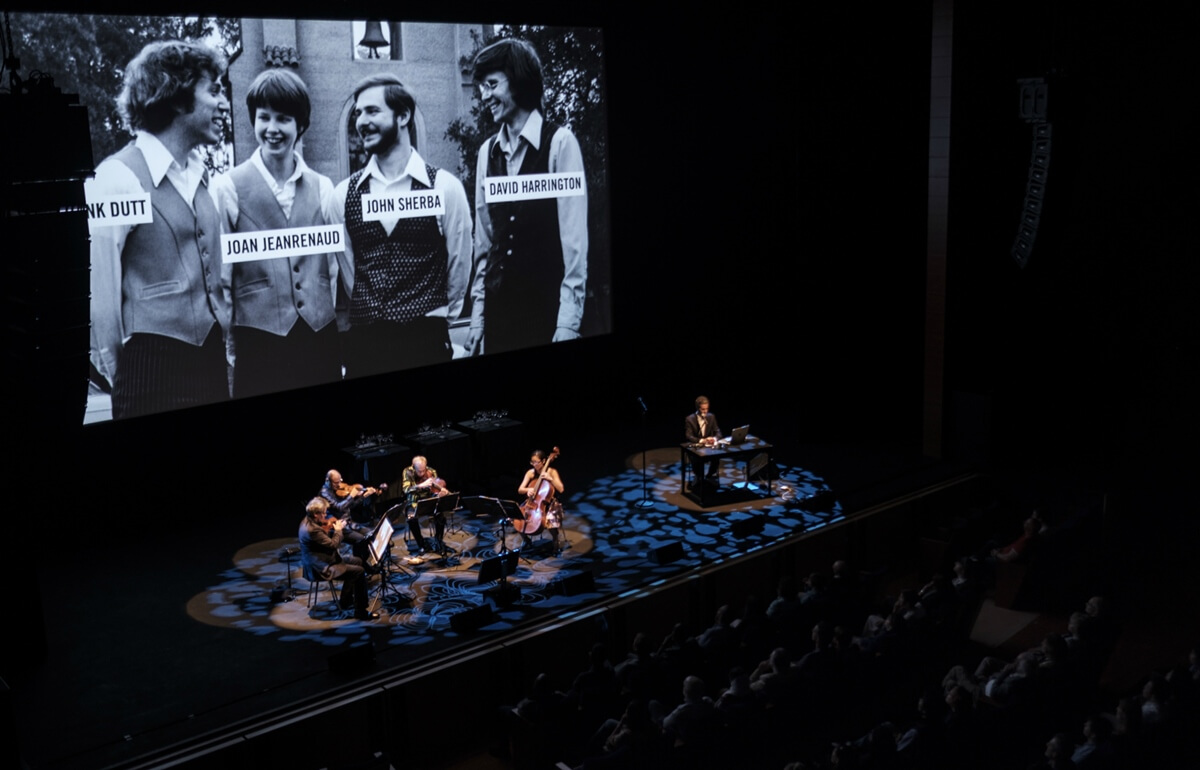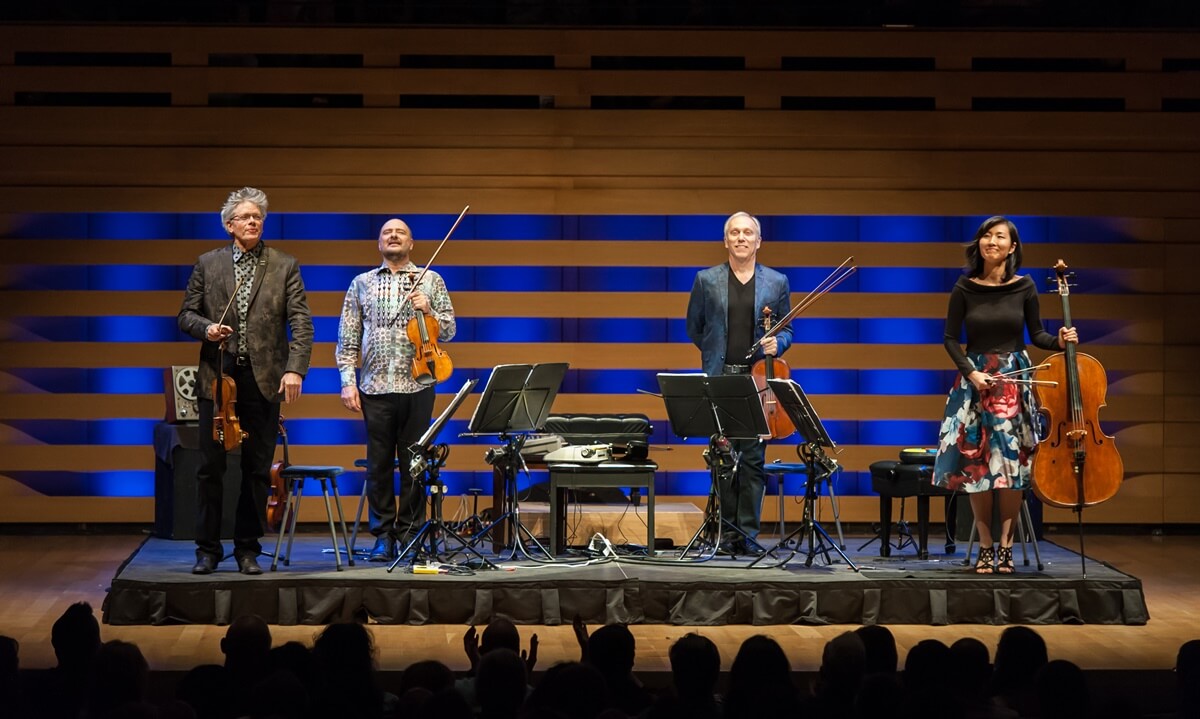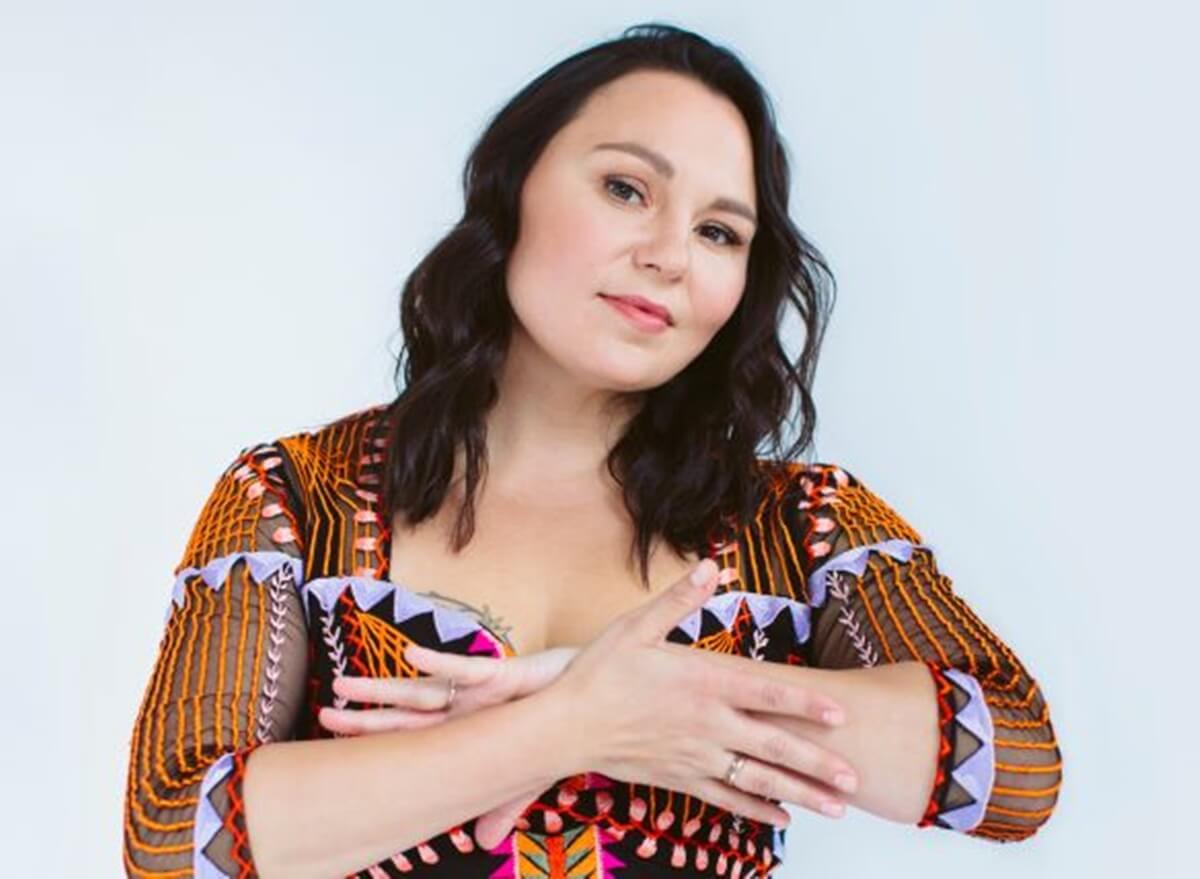
The renowned Kronos Quartet will be in the spotlight for the 2022/23 21C Music Festival, including a special performance with Tanya Tagaq. Their three-day residency kicks off 21C on December 6, 2022.
Among the many other reasons to take it in, it will also be the last chance to see Kronos in its current configuration. Cellist Sunny Yang will be leaving at the end of January 2023 after a decade-long stint with the ensemble. (She’ll be replaced by cellist/composer Paul Wiancko, who will join Kronos in February.)
We caught up with members of Kronos and Tanya Tagaq to talk about their upcoming shows.
Kronos Quartet/Kronos Performing Arts Organization
Violist Hank Dutt has been part of Kronos almost since its inception. “I joined in 1977,” he recalls. As he points out, after 1978, there was a 20 year period where the quartet maintained the same personnel — it allowed for their extraordinary growth both as performers and activists on the world stage.
“It’s like a marriage,” Dutt says of their chemistry. “It can be a great experience when you have like-minded people.”
The quartet’s mission developed over the decades. “In the very beginning, we played everything,” Hank recounts. “But, we always had an affinity for contemporary music.”
They couldn’t help but notice, however, that so many other ensembles were playing the same centuries old repertoire. Coupled with that fact, introducing new music caused a kind of friction among the audience. “There was kind of a fight between them,” he says of the traditionalists vs those who could appreciate new music. “There was a weird vibe in the audience.”
It led to Kronos’ commitment to contemporary music. “We felt we didn’t really need to do the classical or romantic period,” he says. It wasn’t only the principle, however, it was the sheer diversity of contemporary music that drew their interest. “I think that contemporary music has such a bad name when we started out.” From there, they branched into experimentation with global music genres. “We kind of expanded into the world music genre. It’s been very exciting to work with composers from around the world.”
Violinist David Harrington founded Kronos Quartet back in 1972. For David, the quartet’s mission was also a way to incorporate a fascination with elements other than strictly repertoire — such as science — into the music. “I’d think, wow, this is really cool. How can that fit into a musical experience?”
For him, music is in and of the world, and must concern itself with that world. “What musician in the world could not be concerned, for example, with the violence that’s happening in the Ukraine?” he asks. “Climate change? What’s happening in the forests? So many of us play instruments that are made of various woods,” he points out. “When you hear that the forests in the Amazon that have traditionally been harvested to make the best bows or stringed instruments — the figure I heard is that there are 1,800 pernambuco trees left,” he says. “1,800 for the world of bowed string players — that’s a crisis.”
He continues, “Musicians have to be activists. We need peace, we need quiet places to play concerts, safe places. Music that represents humanity has to represent human rights. It’s not a big stretch to think that the music that Kronos is a part of should be involved in activating, energizing our audience.”

A Thousand Thoughts — A live documentary with the Kronos Quartet
On December 6, Kronos will be performing live alongside the documentary A Thousand Thoughts, written and directed by Sam Green and Joe Bini. Live narration also accompanies the screening/performance.
David describes the live documentary concept. “There is a set list, soundtrack, that gets, I guess you would say, injected into the visuals at agreed upon points,” he says. “At the 40th year of Kronos, we wanted something that would give our audiences a sense of some of the things we’d done up to that point.”
The project began as a short film, but Green quickly saw the possibility for a full-length feature. “It was through spending hours and days in and around our rehearsals, our archives, our staff, our composers, that he thought, well maybe he could do something more expansive,” David says.
“It’s very interesting,” Hanks says of the film “In the very beginning, I was kind of against this project. I’m a very private person.” It was filmmaker Sam Green who made the difference. “Sam was so convincing, and also he used a lot of integrity,” he says.
For the quartet, the film is a kind of look back on what they’ve accomplished so far. For fans, it’s a way of getting closer to them as people. “I was surprised at the reaction,” Hanks says. For the Sundance Film Festival premiere in 2018, Kronos performed with the film twice. “The audience was incredible,” he says, calling it “an emotional experience.” It reveals the human side of the musicians on stage. “I think, perhaps, they respond to the integrity of the work,” he says. It’s a reaction that has recurred with each performance. “It’s kind of fun to play.”
“It’s fun to play because a lot of our audience have come to our work at various moments in the last 49 years,” David says. “Sometimes, learning new things about a group or music that you’ve been drawn to is a fun thing.”

Kronos Quartet with students from the Glenn Gould School: Fifty Forward
After two days of mentorship, Kronos Quartet will perform alongside students from the Glenn Gould School on December 8.
Education and outreach to young musicians is a big part of Kronos’ ongoing mission. “First of all, there’s no end of things that can be talked about with music,” David says. “That’s the way music works.”
That focus is what led to Kronos’ Fifty for the Future program. The initiative compiled a library of 50 contemporary works that are designed to guide string quartets in developing the skills necessary to interpret 21st century repertoire.
“I find it one of our greatest projects that we’ve ever done,” Hank says. “We now have all 50 Futures online, which feels terrific.” As he notes, the pieces can be downloaded free of charge, and there are tutorials available online to help with skills development. “It’s sort of what we can give back to the community.” Hank says he has fond memories of working with Toronto students, and of their abilities, on previous visits.
For him, coaching young musicians in the music is also part of his process. The students will be performing pieces from the Fifty for the Future repertoire. “I learn so much from the people who are playing the music,” he says. There is something new and inspiring about each interpretation. “That’s very exciting for me to see that,” he adds. “I love coaching.”
Kronos will joining them to premiere a piece with flexible instrumentation as a septet, then finish with a Philip Glass quartet. “It’s just a gem of a work,” Hank says.

Music for Change — With Tanya Tagaq
Kronos Quartet — Music for Change is the title of the third concert on December 9. The program features pieces by Steve Reich and Stacy Garrop, along with an arrangement of Star-Spangled Banner inspired by Jimi Hendrix’ famous Woodstock performance.
Also on the bill is Mishra Pilu, a piece by Indian composer Aruna Narayan that was written for Kronos’ Fifty for the Future program.
“We’re playing a piece by Aruna Narayan — with her. She’s an incredible composer,” Hank says. He notes that Kronos performed a piece by her father Ram Narayan about 14 years ago. “It was the beginning of our understanding of Indian music,” he says. Ram Narayan first popularized the stringed sarangi, and Aruna has continued in that tradition. “She’s an incredible player,” Hanks says.
“What a marvellous musician Aruna is,” David echoes. It will also be a first. “We’ve never performed with her,” he says. They’ll be playing a new version of her composition.
Other works on the program include pieces by Abel Meeropol and Zacharyu James Watkins. With the exception of the Reich piece, all of the works were either written for or arranged by Kronos.
A world premiere performance of Tanya Tagaq’s Colonizer remix with Kronos rounds out the first half of the program. Tanya and Kronos have a working connection that goes back several years.
“We started off a really long time ago on a project we simply called Nunavut,” Tanya Tagaq recalls. “I just love working with them.”
Tanya’s composition Sivunittinni is included in Kronos’ Fifty for the Future project. It was particularly significant. “They helped me step into my role as composer,” she says.
Tanya Tagaq performs with Kronos Quartet at 21C Music Festival in 2016:
The piece they’ll be performing together is a remix of her Colonizer, a song that she originally released as part of a studio recording. The remix project came together digitally during the pandemic lockdowns. “I just wanted to do a remix album from my album Tongues. I contacted them and was just hoping it was something they’d be interested in.”
In Toronto, Tanya will be taking the stage again after a long break. “It’s my first time since before COVID,” she says. “I’m gonna have to be prepared for that again — it’s going to be fun.”
Performing with Kronos is something else she’s looking forward to. “They’re an artistic force, they’re a political force,” she says. “They’ve been carrying innovation and exploration, and just been executing it for…forever.” She hesitates a split second. “They’re f****** wicked.”
It’s the nature of the performance that makes them perfectly matched, as she explains it. “We love performing together, because I improvise, and they don’t. I’m free, I’m free to do whatever I like,” she says. “I’ll stick to the song itself, but it’s more like Kronos operating as a backbone with their contribution. Where it goes, the feeling, the pitch, the tone, the timing — all of that can be loose.”
While it may stay within the general framework of the song, improvisation is a crucial part of her musical expression. “Well that’s what composition is, making something new,” she says. “The creation is rooted in improvisation, it’s just how you decide to execute.”
“I love the Kronos Quartet — I love them as people, and I love working with them,” she finishes. “I’m so honoured to work with them. It’s just positive all around.”
The feeling is definitely mutual. “She is incredible,” Hank says. “She is a visceral, major force in the music world. When you are on stage with her, you are just taken with her presence.”
“Because of everything that’s been going on over the last several years, we haven’t seen Tanya in I think three years,” says David. “I’m so looking forward to performing with her again,” he adds.
In working on the piece, Hank says the nature of her music provided a way to adapt her sound to a string quartet. “It’s very easy to mimic a voice,” he says. “It’s very adaptable to singing. It was interesting trying to come up with a notation that would follow what Tanya had actually done on stage,” he continues. “Developing those sounds as a string player was an interesting process.”
“If you could say that anyone has a string quartet in her throat, it is Tanya,” David says. “She’s just one of my favourites.”
“Playing with an artist on stage is so exciting,” Hank says. “She always brings so much to her performances, it’s so inspiring.”
The program underscores Kronos’ commitment to using music as a tool for education and change.
“That’s the beauty of music,” says Hank, “because it has the ability to change people’s perspective.”
“We’re really looking forward to this very, very much,” says David. “When I think about all the music that we’ll be playing, and the artists we’ll be playing with,” he sums up, “it will give audiences a feel for the real palette of Kronos.” He adds, “It’s going to be fun for us to be in one place for that amount of time.”
More information and tickets to the 21C Music Festival here.
#LUDWIGVAN
Get the daily arts news straight to your inbox.
Sign up for the Ludwig van Daily — classical music and opera in five minutes or less HERE.
- THE SCOOP | Conductor Yannick Nézet-Séguin Receives Honorary Fellowship From Royal Conservatory - April 19, 2024
- INTERVIEW | Larry Weinstein Talks About His Film Beethoven’s Nine: Ode To Humanity, Premiering At Hot Docs - April 18, 2024
- PREVIEW | JUNIOR Festival Offers A May Long Weekend Of Arts & Performances For Kids - April 18, 2024



